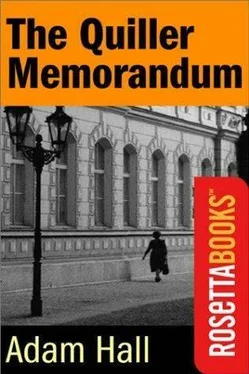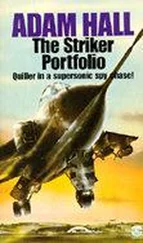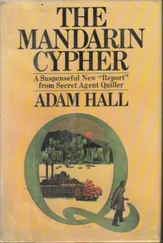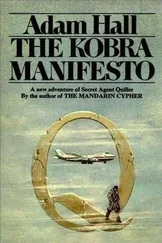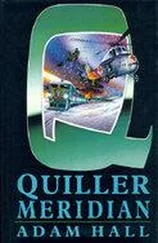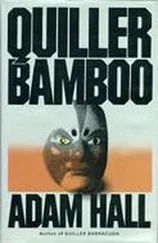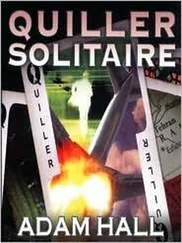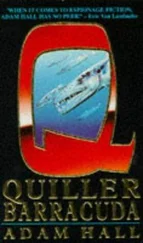
Adam Hall
The Quiller Memorandum
The first book in the Quiller series, 1965
A couple of air-hostesses came in through the glass doors, crisp and pure-looking in Lufthansa uniform. They looked once at the group of pilots who stood at the soft-drinks bar then swung on their spiked heels to preen themselves in the mirrors . The pilots turned to watch them, all of them tall, all of them blond. Nobody spoke. Another girl came in and touched her reflected hair before she turned away and studied her shining fingertips at armslength, glancing up just once at the tall blond men, looking down again with her head tilted, admiring her spread fingers as if they were flowers.
One of the young men grinned and looked among his friends to see who would join him in an approach towards the girls, but nobody moved. A light flashed rhythmically across and across the window, coming from the airport beacon. The two girls left the mirrors, glanced again at the pilots and then stood neatly with their feet together and their hands behind them. Everybody seemed to be waiting.
The boy who had grinned to his friends seemed to venture a step towards the hostesses, but another blocked his foot and the boy shrugged, folding his arms. Into the silence was rising the sound of a jet airliner starting up outside.
This was what they had been waiting for and they all turned towards the centre, looking upwards, listening, all of them smiling now.
The rising sound of the aircraft was not yet very loud, so that I heard the door of the box being opened behind my chair; a wedge of light came against the wall and then went out.
Clearly visible through the big window the dorsal lamp of the airliner began winking, and the sound of the jets levelled out to an even pitch. The pilots tensed and the hostesses took a few delicate eager steps towards the doors, with their bodies turned to face the group of boys.
I was aware that someone had come into the box and was standing behind me. I did not turn my head.
Then the pilots moved in a body towards the centre and the prettiest of the girls flung out her hands and called eagerly: " Who's for the air? "
The tallest of the boys responded: " I am! " His friends chorused to the first notes of the music: " We are! "
"Who's for the sky? " sang the girls, and they were into the number.
Under cover of the music the man sat down in the chair next to mine, shifting it at an angle so that he could face me obliquely. The glow from the stage defined one side of his head and gleamed along the side-piece of his glasses.
" Windsor," he introduced himself.
Who's for a wide blue sky-high fling?
We are! We're on the wing!
" I'm sorry to break into your evening." The man spoke the kind of English that is heard only on the cold-war propaganda networks, the accent unplaceable but definitely there.
"Don't apologise," I said. "This show had too good a press." I had broken a rule, and didn't care.
I had come here because tomorrow I was going home and I wanted to take away a memory, however trivial, of the New Liberal Germany that people talked so much about. The Neukomodietheater was said to be the centre of fresh youthful gaiety (Suddeutsche Zeitung) where the new iteration was making its breakthrough to a kind of music that had not been heard before (Der Spiegel). No one had mentioned the corn.
"What a pity you are disappointed," murmured the man, on your last night in Berlin." He glanced down at the hge and then moved his chair back quietly. "Perhaps I can interest you by way of conversation." For a moment had thought he was leaving, but he had sat down again. His chair was now below one of the little shaded lamps on the wall of the box, so that his face was in shadow. I wondered who he was.
"Perhaps, Mr. Quiller," he said softly, leaning towards "you would care to move your chair closer, so that we can speak quietly." He added: " My name is Pol."
I did not move. "Apart from your name, Herr Pol, I don't know anything about you. I think you are making a mistake. This box was reserved for me exclusively number 7. Yours is possibly Number 1. The figures are sometimes confused."
The girls and boys were wheeling about the stage with heir arms out like wings, swooping and diving and cleverly missing each other in what the press called an aerial ballet of intricate patterns that bespelled the eye. Now the stage lights went dim and the dancers were seen to be wearing tiny electric lamps on their hands as they wove their way about each other. I was saddened. Even the bright new generation couldn't make its breakthrough without putting on a number that unconsciously resembled an air-battle.
Pol said gently: "I came to talk to you here because it is a good place. Better than a cafe or your hotel. I was not seen coming here, and if you would care to move your chair back we should be completely concealed, in this light."
I said: "You're mistaking me for someone else. Don't oblige me to call the usher and lodge a complaint."
He said: "Your attitude is understandable, so I won't cavil."
I moved my chair back and sat closer to him.
"All right," I said.
` Windsor ' was the presently operating code-word, given as a name, when approaching a contact. The C-group had been in operation since the first of this month, giving us `care,' ` call ' and `cavil.' I would have cleared him provisionally on 'cafe' alone, because he knew three things about me: my name was Quiller, my box number was 7, and this was my last night in Berlin. But I had thrown him ` call ' to get ` cavil' simply in the hope that he wasn't a contact at all, but someone who had wandered into the wrong box and used the word 'care' by chance.
I didn't want any more contacts, any more work. Six months in this field had left me sickened and I wanted England more than I had ever wanted her before.
It was no go. This was a contact.
Uncivilly I told him to explain how he had known which box I was in.
He said: "I followed you here."
"You didn't." I knew when I was being followed.
"Correct," he said.
So it had been a test for me: he had wanted to know if people could follow me about without my realising it. I resented the trap.
"We knew that you had reserved this box," he said.
I looked down at the firefly dance on the stage. The music played softly. It took me three or four seconds. I had booked for the show by phone, asking for a box because I didn't want to sit with anyone: half my six months had been spent sitting wedged between people at the trial and I felt contaminated. This reservation had been made in the name of Schultze, so he could have gone right through the list at the box-office without finding me. There was only one way.
Between us we set three quick traps and sprung them:
"So you've got access to the box-office," I said.
"Yes."
"No go. I used the name Schultze."
"We knew that."
"By tapping my phone."
He said: " Correct."
My leading trap had been set to find out if he were still testing me. He was. Otherwise he would have said, 'No, we didn't go to the box-office.' Instead, he had trapped me back at once with the one word – ' yes ' – to see if I'd spring it. I did: with ' Schultze '. Even then he wouldn't let me off the hook, because I had only gone half-way, telling him that I knew he would have drawn blank at the box-office. That was how they hadn't found me; he wanted me to tell him how they had. He wanted the other half: how had they known about Schultze? So I threw it for him and he took it: ` Correct.'
Читать дальше
